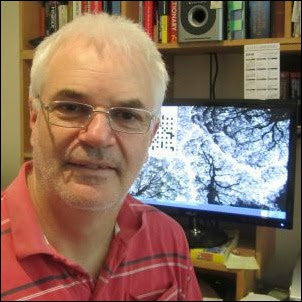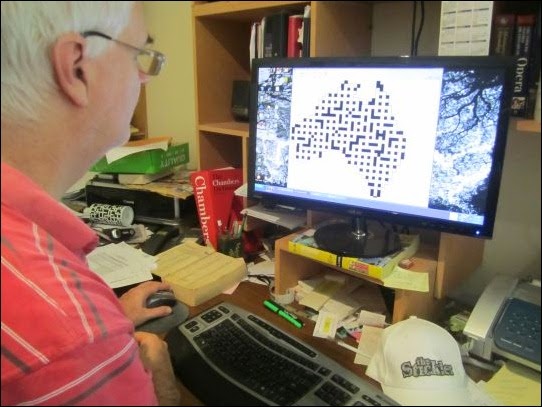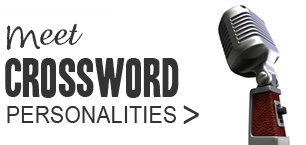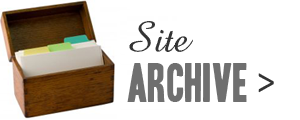 In the rocky economy of these times, can one take up crossword setting as a full-time career? Australian setter David Stickley, whose daily crossword The Stickler was discontinued in 2013 after a 15-year run, speaks about the risks of the profession and how he coped with them.
In the rocky economy of these times, can one take up crossword setting as a full-time career? Australian setter David Stickley, whose daily crossword The Stickler was discontinued in 2013 after a 15-year run, speaks about the risks of the profession and how he coped with them.
David Stickley has the distinction of setting cryptics for publications across three major homes of crosswords: US, UK and Australia. In this interview, David also talks with us about the influence of American cryptics on his personal setting style and the concept of "fairness" in crosswords, which has evolved for him as he matured as a setter.
Q1: When and how did you get interested in crosswords?
David: My Year 10 (age 15) English teacher was crazy about cryptics. Every week for a school year the class solved The Guardian which appeared in the local Sunday paper. He taught the class how to solve and we documented all the devices. When finished, we would write up each crossword detailing "new' words, idioms, references to literature, geography etc. He believed you could learn a lot from cryptics, and so do I. I think it's also true that people should be taught how to solve rather than trying to pick things up as they go.
Q2. What difference does it make – being taught how to solve cryptics versus picking things up on one's own?
David: I think it's the difference between learning about house construction by living in it and learning by talking and working with a builder. On your own you will pick up some useful stuff but there's a really good chance you'll miss out on some fundamentals. At a recent crossword class, a student who had been learning by looking at answers and working backwards announced that her whole cryptic world had changed because I told her that the definition in almost all cases was at the start or end of the clue. Seems basic, but not necessarily obvious to someone who is focussing on the content rather than the structure of clues. How-to solve cryptic crossword books may be helpful but generally they focus on explaining how clues work rather than providing an approach solvers can use to actually solve clues. A new solver can learn a lot from an experienced one just by observing their solving processes and quizzing them on their thoughts as they solve.
Q3: How did you start setting crosswords? Which publications do you set for?
David: By the end of Year 10 I was solving The Guardian by myself and looking for more challenges, however senior high school was busy and a career in IT beckoned, so my solving dropped off. Once finished with study and settled into a job, I returned to cryptics and soon started to wonder if I could earn a little on the side to supplement my income through setting. I fell into all the rookie traps: writing from a solver's point of view rather than a setter's; trying to mimic the style I knew the best; not really knowing cryptic and general crossword fundamentals; and not listening to solver friends. There was also a whole publishing world out there that operated in a particular way that I didn't understand and this was a huge (unknown) stumbling block to a budding setter who relied on sending samples off to editors to try and get a break.
Things changed for me when I joined the Australian Crossword Club who encourage members to submit crosswords for publication in their monthly magazine, CrOzworld. It was a great opportunity to "get published" and to receive feedback from experienced solvers. Over a number of years I learnt a lot and my puzzles got better. My big break came when a new, non-standard cryptic appeared in the Australian Financial Review and I convinced the editor that my more traditional cryptic would complement the other one. I started every second week and took over after 6 months.
I still set for the Australian Financial Review and do a hybrid puzzle (The Omega) for the Sydney Morning Herald. I'm an occasional setter for the FT and recently had my first Church Times puzzle published. For 15 years I set puzzles for News Ltd in Australia, more than 5000 cryptics in three of their major state newspapers. I've also had a cryptic in the NYT.
Since my full-time crossword business ended I've been writing a free crossword for fans called The Stickler Weekly and released a set of 25 (updated) published Sticklers.
Q4: You've mentioned that your daily crossword, The Stickler, got axed by News Limited in 2013, in favour of another "simpler" puzzle. Do you see a general "dumbing down" of puzzles in mainstream media, a diminishing audience for challenging puzzles?
David: The change to a simpler puzzle didn't reflect the ability or desire of the cryptic-solving Australian public, it was purely a cost-cutting measure, however, the fact that it could happen and that despite protests, the decision wasn't reversed, probably reflects the state of cryptics in general in Australia. We don't have a cryptic culture largely due to the small number of publications that carry cryptics and the tendency from the very early days for crosswords to be imported. At this very moment no News Ltd papers carry a daily 15x15 cryptic written by an Australian and The Stickler was the only one published in the last 15 years. The SMH/Age/AFR newspapers are the only ones promoting Australian cryptic crosswords at the moment. This fractured crossword history has left a small, aging, faithful group of solvers and a very small group of unchallenged setters flying the cryptic flag.
Q5: After The Stickler was discontinued, how did you fill the financial vacuum? You were considering a career change in July 2013 – what did you eventually take to doing?
David: The vacuum hasn’t been filled unfortunately. Losing 9 cryptics a week effectively ended my crossword business and it became obvious very quickly that things would only get worse as newspapers make further cuts and possibly disappear as printed entities altogether. My encouraging solvers suggested I start an online subscription service but I wasn't sure it would be viable, so I started The Stickler Weekly and asked for contributions. I made a 6-month commitment with the promise of an evaluation at the end which you can find here. I knew in my heart that my full-time crossword career was over and I had to reinvent myself to pay the bills. So far not much has eventuated – we are surviving on some crossword/word puzzle work and a little IT consulting.
Q6: How should a crossword setter cope with such changes in the publishing world? Is it practical/wise to think of crossword setting as a full-time profession?
David: I was reading Anax's blog some time back and he was questioning his decision to quit his job to pursue a crossword career. I think he is doing Ok at the moment, but it would be a brave move for any setter, even in the UK, to give up their regular job for crossword setting. In Australia there's now no way to survive on crossword writing alone – too few outlets and poor pay. Free access to crosswords on the internet means solvers don't have to pay anything to get their fix. The only way I survived as long as I did was through volume and diversity.
Q7: Are cryptics in Australia any different from cryptics in UK?
David: Yes. Fewer outlets. Less sophisticated solving group. An average level of quality due to lack of real competition.
Q8: What is your personal style as a crossword setter?
David: I started out following The Guardian crosswords of the time and slowly refined my style to include or exclude devices that I don't like/do like when I solve. Two significant events helped shape me as a setter: setting a cryptic puzzle for the NYT and preparing and running cryptic-solving classes. Will Shortz was my first real crossword editor. Despite being the author of about 1,000 cryptics by 2001, I'd never had anyone with real crossword experience review my cryptic puzzles – they generally were checked for spelling and published. I was aware of the "no definition/wordplay etymology crossover" rule at play in the US, but hadn't considered it seriously until I was forced into applying it when writing my NYT cryptic. I enjoyed the experience immensely mostly due to the extra restrictions it placed on what I could do as a setter. It created more "pure" clues, made me think more creatively and suited my goal of trying to appeal a broad audience including new solvers (clues constructed in this way tend to be easier to solve). I started to see how much UK and Australian setters relied on synonym substitution and felt cheated as a solver when I realised how little effort had gone into such clues. I continue to strive to follow this US cryptic convention mostly for my own satisfaction as 99% of solvers would have no idea what I'm doing. Running cryptic-solving classes in my local community college also opened my eyes greatly, changing my focus from only worrying about being able to justify my work to creating clues and crosswords that solvers could enjoy and solve without knowing all the secret tricks. In a nutshell, I think I create consistent, simply-constructed cryptics that anyone could solve with the right teaching and a little experience.

A cryptic solving class at Laneway Learning, Sydney.
Q9: This device of "synonym substitution" that you mention – can you explain with an example?
David: Here's a clue published in the UK: Most women have this combination of give and take (7) Answer: HANDBAG; HANDBAG = HAND + BAG. Yes it does, and there's nothing really cryptic about it except the word form of the components. All the setter had to do is consult a thesaurus and come up with a readable combination. In this case, both parts of the clue have been substituted, but it's more common for one part to be clued this way. Most solvers won't think twice about it (or care), except, perhaps, when they think "isn't that really the same thing?" or "how cryptic is that?". Normally a different part of speech is used, theoretically separating the answer's component with the wordplay's, but, as an experienced solver I don't really see much of a difference when I'm in the process of solving. Don't get me wrong: it's a perfectly acceptable setter's tool in the UK and Australia and solvers ultimately would rebel if they thought otherwise. It's just something I now actively avoid using because it can make me a lazy setter.
Q10: Are you saying that the US cryptic is superior to the UK cryptic?
David: No. Making general statements about many aspects of crosswords, clues, and setters is pointless as opinions on such things are subjective and not quantifiable. I have to smile when I hear a setter say that they are tough but always fair, as it isn't them that actually determines "fairness". It’s the individual solvers. Same with quality/cleverness etc, all a setter can do is their best, the result will be judged by the solvers, who will have wide-ranging opinions. I like the concept behind US cryptics, it reflects how I like to feel when I solve, and it works for me. It's different for everyone. I've seen prominent UK crossword commentators remark on the easiness of US cryptics – I wonder if they know why it's the case.
Q11: Who are your favourite setters? Which are your favourite clues?
David: I don't solve nearly as much as I should but setters who appear to be thinking about the solver rather than themselves when they write clues appeal to me more. I'm not a big fan of lots of cryptic definitions in crosswords, and clues with wordplays that take much unravelling after the answer has been found miss the cryptic point IMO. So setters who focus on these types of clues aren't my favourite, everyone else I'm happy to solve.
Favourite clues? I think that has to be the most common question in interviews and I always disappoint because I don't have any. The ones that most setters quote tend to be cryptic definitions, I suspect because they are easy to remember and can be readily understood by the uninitiated. As a cryptic definition doesn't represent a standard cryptic clue, I'm loathe to give one as a favourite, but I do have a favourite type: the humble anagram. There's nothing better than a well-disguised anagram: a clue type that's easy to explain and easy to learn how to solve.
Q12: How proficient are you as a crossword solver?
David: I've been solving since I was 15 – that's 38 years. Although I don't solve as much as I should, it doesn't take me long to pick up on a setter's/crossword's style and way of doing things. A few Times puzzles and I'm back up to speed, likewise most of the UK crosswords. I will say though that solving as a setter isn't as pleasurable as it was. Sometimes I’ve solved a clue and not even realised how good the surface was, simply because I instantly break things down into components and stop thinking of clues as connected words. There are also many more things now that irk me in clues – not my style – and I find it hard to look past them. An Australian setter once told me I'd make a good crossword editor, but I'm not so sure: there's style and there's wrong – that's just the way I see it.
Q13: What are the types of puzzles you set apart from cryptic crosswords? How long does it take you to create each of these?
David: There's virtually no type of puzzle I haven't set. It was the only way to survive as a setter. Having cryptics published meant credibility and the opportunity to write other types of puzzles. I've done quick, general knowledge, themed, codewords, clues in squares, kids crosswords, holiday specials, giant crosswords – at one stage my wife and I produced most of the puzzles for a women's magazine's puzzle book (70 puzzles monthly) that focussed on celebrities, TV and entertainment. It was the only way to get by financially. Time taken for each type of puzzle varies greatly of course, but cryptics always take the most time. It's safe to say that the more you do, the faster you get, as you learn the best and most efficient way to get the job done.

David Stickley working on the Map of Australia grid, which he has used for Australia Day holiday puzzles. The grid holds 80 clues.
Q14: What are the tools/references you use for setting crosswords?
David: I've been using Crossword Compiler since about 1995 and find it does everything I need to produce professional crosswords. I've also had a hand in a number of significant feature improvements which makes me feel like it's part of me. The Pro Grid Filler is installed as it makes a huge difference to the speed and control a setter has when filling grids. I've long since dispensed with printed references and use a large number of electronic references directly accessible through Crossword Compiler when filling grids and clue-writing. I use the Macquarie Dictionary & Thesaurus, the Australian Oxford and Chambers (through CC's sidekick, WordWeb), Collins, and Random House. I’ve got tons of lists containing indicators and abbreviations etc, all available at the click of an icon.
Q15: Tell us of a clue or puzzle that you are proud to have authored.
David: There was a time when I considered a crossword to be acceptable (from my point of view) if its clues passed muster technically AND a couple of clues tickled my fancy. That way I could always justify my answers and claim to have included some cleverness as well. Again, it used to be about me, not the solver. Now I want and strive for every clue to hit the mark in some way, and I'm reluctant to leave a clue that I think may appear to have been given less than full attention. Here are some clues from one recent Stickler Weekly puzzle:
Female performers, a cast originally with Hair? (9) ACTRESSES; A+C+TRESSES
Right around? (5) GIRTH; (RIGHT)* &lit
Paintings, say, fixed in thickness to a certain degree (6) PARTLY; PLY around ART
Dry and bitter but not cold (4) ARID; ACRID - C
A number of diners sent ratatouille back with a bitter taste (8) TARTNESS; letters from 'dinerS SENT RATatouille', reversed
It's hard to aim for greatness but just a little extra effort can achieve consistently good work.
Q16: You say in your Stickler Story: "The first Stickler, published 6th April, 1998, wasn’t anything special...many of the clues would be different if written in 2013." Can you take a clue that you wrote in 1998, and tell us how and why you'd write it differently today?
David: 24-across in the first (1998) puzzle reads:
A ton picked up is cheered (9)
Answer: ACCLAIMED; A + C + CLAIMED
The 1998 clue has an average surface, requires the solver to equate "ton" to century in cricket and then leap to century = C, and add "picked up" = claimed. As 'acclaim' is derived from 'claim', I would deem it unacceptable to use 'claim' that way nowadays.
A more recent clue for the same word is:
Celebrated academic mistaken about first part of lecture (9)
The newer clue celebrates my love for anagrams and the surface is much better.
Q17: What are your interests apart from crosswords?
David: I like swimming (doing laps in a pool), walking and enjoy cooking. For the last 5 years I've been making my own sourdough which brings me much satisfaction.
Related Posts:
If you wish to keep track of further articles on Crossword Unclued, you can subscribe to it in a reader via RSS Feed. You can also subscribe by email and have articles delivered to your inbox, or follow me on twitter to get notified of new links.






1 comment
Engaging as always, listening to you David.
The concept of crossword setting being a full-time job is something not many would be able to relate to - I certainly cannot.
Good luck and I hope to see many more Sticklers in the future.
Post a Comment